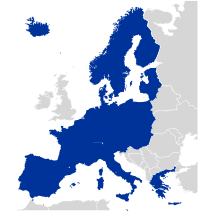
The Council of the European Union, often referred to in the treaties and other official documents simply as the Council, and informally known as the Council of Ministers, is the third of the seven Institutions of the European Union (EU) as listed in the Treaty on European Union. It is one of three legislative bodies and together with the European Parliament serves to amend and approve the proposals of the European Commission, which holds legislative initiative.
Politics in Estonia takes place in a framework of a parliamentary representative democratic republic, whereby the Prime Minister of Estonia is the head of government, and of a multi-party system. Legislative power is vested in the Estonian parliament. Executive power is exercised by the government, which is led by the prime minister. The judiciary is independent of the executive and the legislature. Estonia is a member of United Nations, the European Union, and NATO.

The European Parliament (EP) is one of three legislative branches of the European Union and one of its seven institutions. Together with the Council of the European Union, it adopts European legislation, commonly on the proposal of the European Commission. The Parliament is composed of 705 members (MEPs). It represents the second-largest democratic electorate in the world and the largest trans-national democratic electorate in the world.
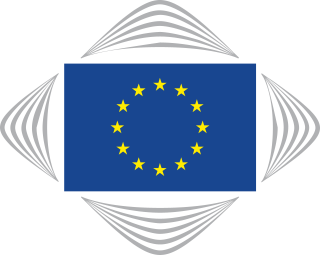
The European Committee of the Regions (CoR) is the European Union's (EU) assembly of local and regional representatives that provides sub-national authorities with a direct voice within the EU's institutional framework.

The President of the European Parliament presides over the debates and activities of the European Parliament. They also represent the Parliament within the EU and internationally. The president's signature is required for enacting most EU laws and the EU budget.

The Pan-African Parliament (PAP), also known as the African Parliament, is the legislative body of the African Union and held its inaugural session in March 2004. The PAP exercises oversight, and has advisory and consultative powers, lasting for the first five years. Initially the seat of the Pan-African Parliament was in Addis Ababa, Ethiopia, but it was later moved to Midrand, Johannesburg, South Africa.

The institutions of the European Union are the seven principal decision-making bodies of the European Union (EU). They are, as listed in Article 13 of the Treaty on European Union:

The politics of the European Union are different from most other polities and states due to the unique nature of the European Union. The EU is similar to a confederation, where many policy areas are federalised into common institutions capable of making law; the competences to control foreign policy, defence policy or the majority of direct taxation policies are mostly reserved for the twenty-seven state governments. These areas are primarily under the control of the EU's member states although a certain amount of structured co-operation and coordination takes place in these areas. For the EU to take substantial actions in these areas, all Member States must give their consent. Union laws that override State laws are more numerous than in historical confederations; however the EU is legally restricted from making law outside its remit or where it is no more appropriate to do so at a state or local level (subsidiarity) when acting outside its exclusive competences. The principle of subsidiarity does not apply to areas of exclusive competence.
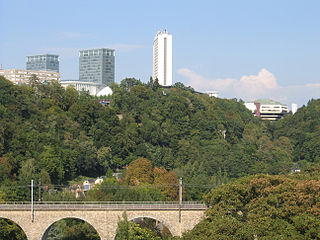
The Secretariat of the European Parliament is the administrative body of the European Parliament headed by a Secretary-General. It is based in the Kirchberg district of Luxembourg City and around the Brussels-Luxembourg Station in Brussels and employs 4000 officials.

The Constitution of the Italian Republic was enacted by the Constituent Assembly on 22 December 1947, with 453 votes in favour and 62 against. The text, which has since been amended sixteen times, was promulgated in an extraordinary edition of Gazzetta Ufficiale on 27 December 1947. The Constituent Assembly was elected by universal suffrage on 2 June 1946, on the same day as the referendum on the abolition of the monarchy was held. The election was held in all Italian provinces. The Constitution was drafted in 1946 and came into force on 1 January 1948, one century after the Constitution of the Kingdom of Italy, the Statuto Albertino, had been enacted.

The Bureau of the Pan-African Parliament is essentially the leadership of the Pan-African Parliament (PAP) and consists of one President and four Vice-Presidents.

The Committees of the European Parliament are designed to aid the European Commission in initiating legislation.
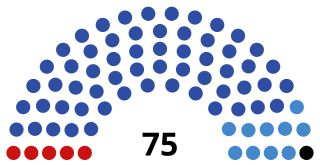
The State Council of Crimea is the parliament of the Republic of Crimea. It had previously been called the 'Supreme Council of Crimea' but changed its name in March 2014 following a vote by the Ukrainian parliament to dissolve the Supreme Council of Crimea. The Parliament is housed in the Parliament building in the centre of Simferopol.
The Bureau of the European Parliament is responsible for matters relating to the budget, administration, organisation and staff. It is composed of the President of the European Parliament along with all 14 Vice-Presidents and the five Quaestors. They are elected for two and a half years with the President holding a casting vote. Elections are usually held at the start, and at the midpoint, of each Parliamentary term.
European Union (EU) concepts, acronyms, and jargon are a terminology set that has developed as a form of shorthand, to quickly express a (formal) EU process, an (informal) institutional working practice, or an EU body, function or decision, and which is commonly understood among EU officials or external people who regularly deal with EU institutions.
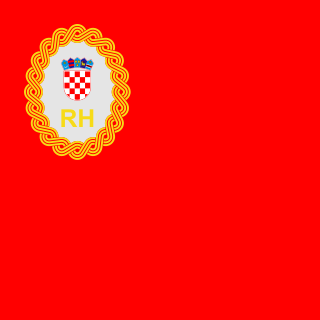
The speaker of the Croatian Parliament is the presiding officer in the Croatian Parliament, Croatia's legislative body.
The Committee of European Banking Supervisors (CEBS) was an independent advisory group on banking supervision in the European Union (EU). Established by the European Commission in 2004 by Decision 2004/5/EC, and its charter revised on 23 January 2009, it was composed of senior representatives of bank supervisory authorities and central banks of the European Union. On 1 January 2011, this committee was succeeded by the European Banking Authority (EBA), which took over all existing and ongoing tasks and responsibilities of the Committee of European Banking Supervisors (CEBS). The European Banking Authority was established by Regulation (EC) No. 1093/2010 of the European Parliament and of the Council of 24 November 2010.

The INGO Conference is the body representing civil society in the Council of Europe, a European organisation founded in 1949. The Council of Europe has 47 member states with some 800 million citizens and its seat is in Strasbourg, France. The current president is Anna Rurka.

Ramona Nicole Mănescu is a Romanian politician and lawyer. From 24 July 2019 to 4 November 2019, she served as minister of Foreign Affairs in the Romanian Government. She was a Member of the European Parliament serving 2007 to 2013 and 2014 to 2019 from the National Liberal Party, active within the European People's Party. As part of this group she is a member of the European Parliament Committee on Foreign Affairs, vice-chair in the Delegation for relations with the Mashreq countries and a substitute member in the Committee on transport and tourism and in Delegation for relations with the Arab Peninsula.
In parliamentary systems and presidential systems of government, primary legislation and secondary legislation, the latter also called delegated legislation or subordinate legislation, are two forms of law, created respectively by the legislative and executive branches of government. Primary legislation generally consists of statutes, also known as 'acts', that set out broad outlines and principles, but delegate specific authority to an executive branch to make more specific laws under the aegis of the principal act. The executive branch can then issue secondary legislation, creating legally enforceable regulations and the procedures for implementing them.



